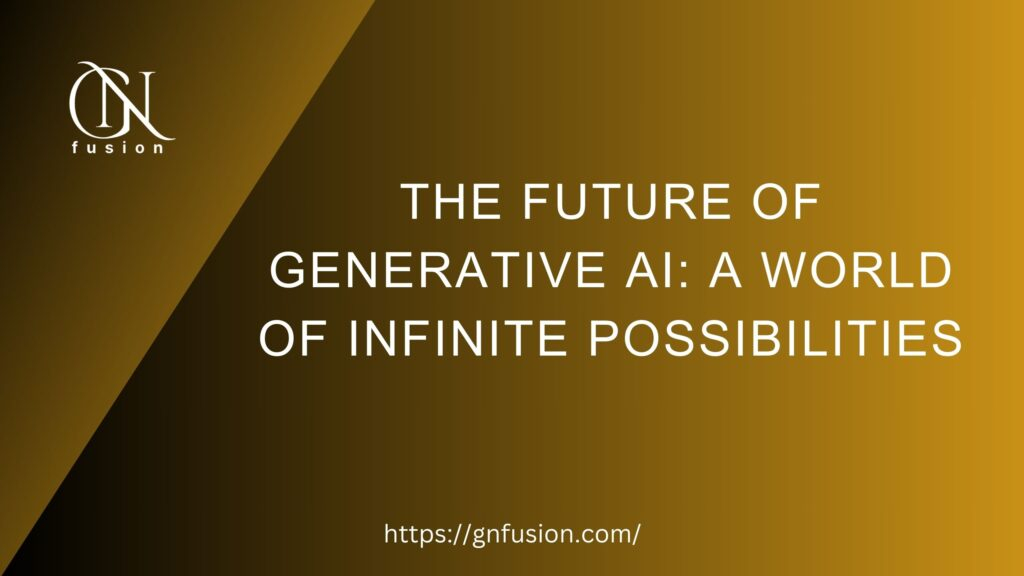Introduction
The world of artificial intelligence is on the brink of a transformative era, and at the heart of this revolution lies generative AI. These advanced models have the power to create content and solve complex problems, redefining the way we interact with technology and the possibilities it offers. In this blog, we will explore the future of generative AI, from its increasing realism and creativity to its ethical and environmental implications. Let’s delve into the exciting journey that lies ahead.
Increased Realism and Creativity
Generative AI has come a long way, but it’s just the beginning. Future models will push the boundaries of realism and creativity, producing content that is virtually indistinguishable from human creations. Whether it’s generating lifelike text, images, music, or even video, these models will continue to blur the line between human and AI-generated content.
Multimodal Capabilities
Imagine AI models that can seamlessly work with multiple data types, such as text, images, and audio, simultaneously. This multimodal capability will enable new forms of immersive storytelling, where narratives can come to life in ways previously thought impossible.
Personalization at Scale
One of the most promising aspects of generative AI is its potential to provide highly personalized experiences on a massive scale. From education tailored to individual learning styles to product recommendations that suit personal preferences, generative AI will cater to the unique needs of each user.
Mastering the Generative AI Revolution: How to Transform, Pivot, and Adapt Your Strategy for Success
Industry-Specific Solutions
Customized generative AI models will be developed for specific industries, from healthcare and finance to education and manufacturing. These models will address industry-specific challenges and tasks, potentially revolutionizing the way professionals work and solve problems.
Enhanced Human-Machine Collaboration
Generative AI will not replace humans but rather complement their abilities. Effective collaboration between humans and AI will become the norm in various professions, making tasks more efficient and opening doors to new possibilities.
Content Moderation and Verification
In an age of digital information, the battle against disinformation and the maintenance of content integrity is critical. Generative AI will play a crucial role in automating content moderation and fact-checking, ensuring that only accurate and reliable information reaches the public.
Natural Language Interfaces
Advanced chatbots and virtual assistants powered by generative AI will provide more natural, human-like conversational interactions. This improvement in user experience and customer support will redefine the way we interact with technology.
Innovations in Art and Design
The creative industry will witness a revolution as generative AI pushes the boundaries of art, design, and architecture. These tools will enable new forms of expression, fostering innovation and creativity.
AI-Generated Music and Entertainment
AI-generated music, films, and other forms of entertainment will become more common. This will lead to the emergence of entirely new genres and experiences, expanding the horizons of what is possible in the world of entertainment.
Continuous Learning and Self-Improvement
Future generative AI models will be capable of continuous learning, adapting to new data and evolving trends without significant human intervention. This will keep them relevant and up-to-date in a rapidly changing world.
Responsible AI Development
As generative AI becomes more prevalent, the emphasis on ethical and responsible AI development will grow. Organizations and researchers will implement safeguards to address issues such as bias, fairness, and transparency to ensure that AI benefits society as a whole.
Environmental Considerations
AI’s energy consumption has been a concern, but future generative AI models will likely be designed with environmental sustainability in mind. Minimizing their carbon footprint and energy consumption will be a priority.
Legal and Regulatory Frameworks
As generative AI becomes more integral to our lives, legal and regulatory frameworks will evolve to address intellectual property, privacy, and safety concerns. These frameworks will ensure that AI is used responsibly and ethically.
AI in Scientific Discovery
Generative AI will play a pivotal role in scientific research, accelerating discoveries in fields such as drug development, materials science, and climate modeling. It will help researchers process vast amounts of data and find patterns that were previously hidden.
Master Generative AI: Automate Content Effortlessly with AI
Customization and Personal Assistants
AI personal assistants will become even more tailored to individual users, providing not only assistance but also companionship and emotional support. This personal touch will enhance the human-AI relationship.
AI in Education
Generative AI will revolutionize education by providing personalized learning experiences, creating educational content, and offering adaptive tutoring. This will make learning more engaging and effective, ensuring that students get the education they need.
AI-Generated Innovation
Generative AI will become a driver of innovation, generating new ideas, inventions, and prototypes that push the boundaries of technology and business. This will result in advancements that we can’t even imagine today.
Bottom Line
The future of generative AI holds immense promise. It has the potential to improve our lives, drive economic growth, and address pressing global challenges. However, it also raises ethical and societal questions that we must carefully consider and address as generative AI continues to evolve. The journey ahead is filled with infinite possibilities, and it is up to us to ensure that generative AI serves as a force for good in our rapidly changing world.
If you enjoy this article or find it helpful. Please like, comment, and share this post.


